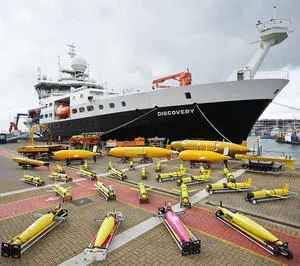
The National Oceanography Centre (NOC) is a partner in a new £2.5-million Centre for Doctoral Training in the use of ‘robotic’ systems for environmental sciences.
The NOC component of the centre will focus on innovative marine robotics and sensors, which can be used to address key scientific challenges such as climate change, deep-sea exploration, and identification of biodiversity ‘hotspots’. The fleet of marine robots based at the NOC has recently developed into one of the most advanced in the world.
Prof Russell Wynn from the NOC, and Chief Scientist of Marine Autonomous and Robotic Systems, said: “We are delighted that Southampton is at the heart of this new training initiative, which strengthens our position as a national hub for marine robotic vehicles and sensors. The fleet of marine robots maintained by the NOC will form an important component of this exciting multi-disciplinary training programme, which will attract excellent students who will be able to deliver key skills to our industry and government partners.”
This project is being led by the University of Southampton, and also involves the British Antarctic Survey, Heriot-Watt University, University of East Anglia, and the Scottish Association for Marine Science. Between all six organisations, this school will teach skills in a range of unmanned systems – which can monitor everything from erupting volcanoes to algal blooms in the ocean.
Kevin Forshaw, Director of Enterprise and Impact at the NOC, said: “By teaching students the knowledge and skills the marine autonomy sector urgently needs, this training centre is part of the NOC’s ongoing programme of supporting business. This sector is currently valued at £9 billion and is rapidly expanding.”
The centre is called NEXUSS (NEXt generation Unmanned Systems Science), and is funded by the Natural Environment Research Council (NERC) and the Engineering and Physical Sciences Research Council (EPSRC). It will provide training to over 30 science and engineering PhD students, with the first intake due to start in autumn 2016.